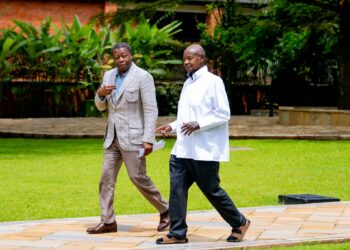President Yoweri Museveni has given one month to five oil firms to decide on several government proposals.
Firms Total E & P, China National Offshore Oil Company and Tullow met with the President on October 31 at State House, Entebbe to discuss key issues still hindering a final investment decision.
The Permanent Secretary in the Ministry of Energy and Mineral Development Robert Kasande confirmed attending the meeting and said, “We have given them a month to come back to us.”
According to the East African newspaper, top on the agenda of the meeting was a failure to agree on an assessment by Uganda Revenue Authority of $167 million as due capital gains tax from Tullow’s aborted farm down of 21.5 per cent of its current 33.3 per cent to Total E & P and CNOOC.
The government is said to be against a proposal by Total to cover the difference of $83.5 million to be reclaimed at a later date from Tullow’s recoverable costs once the farmdown has been completed.
The other contentious issues include a demand by the joint venture partners to be allowed to recover their costs before payment of taxes.
The government has suggested a formula that puts a cap on recoverable costs each year to allow it recover some taxes.
Another contentious issue is where to domicile the crude oil pipeline company—for tax purposes. The oil companies want the pipeline domiciled in a country with friendlier laws on taxation of dividends while both Uganda and Tanzania insist on a share of the dividends.
The oil executives are said to have suggested domiciling the pipeline company in the United Kingdom because it does not tax dividends. The government was willing to compromise on that matter provided the partners agree to also incorporate locally.
Should the oil firms agree, the government expects them to issue statements about a readiness to progress to the next phase though this will not lead to an immediate announcement of the Final Investment Decision (FID).
Uganda joins the exporters club:
The prospects for the hydrocarbon sector in Uganda are looking bright – Uganda will soon export its first crude oil from its Lake Albert oil discovery to the international market, making it one of the countries to have joined the oil exporting countries after the government came to an agreement with Tanzania that enables it to transport its crude oil through the East African Crude Oil Pipeline (EACOP), a 1,445-kilometre pipeline from Hoima, Uganda, to the port of Tanga in Tanzania is the proposed route.
“It is exciting times for Uganda, we are now preparing for production,” Hon Irene-Margaret Muloni, minister of energy and mineral development, Uganda, says. “It has taken us some time, but we are there. The exploration discovered six billion barrels and we have plans to recover about 1.4 billion of these. And now the issue is to get that out of the ground. We’ve already agreed with Tullow, Total and CNOOC the way forward to commercialise that oil.
“We need two big destinations. One is access to the international markets through the pipeline to add value and ensure security of supply within the East Africa region. Also, we are importers of petroleum products now, so we have a refinery under development.” That refinery is planned for Kabaale in Western Uganda’s Hoima district, along the eastern shore of Lake Albert, close to the border with the Democratic Republic of Congo. Once the refinery is completed, expected to be in 2022, it will produce kerosene, gasoline, diesel, heavy fuel oils for Uganda and other local markets. In addition to the refinery an airport, hospital and a 100-megawatt thermal power plant are being constructed.
“For these two big projects the pipeline is more advanced with the FEED signed and an intergovernmental agreement with Tanzania. We are now negotiating the host government agreements between us and setting up the private companies that are going to own and operate the pipeline. For the refinery we’ve already approved the configuration of the refinery that will handle 60,000 barrels per day. Those two projects are ongoing and as a country we are preparing the infrastructure.”
With the Lake Albert oil beginning to flow, Uganda has set its sights on further resources and in May announced a second licensing round for additional oil exploration in five blocks in western Uganda that will be announced before the end of 2019. “It is all about attracting companies to come and join us in the exploration. We have only licenced about 15% of the resources but the appetite is there because the parameters are world class. The success rate when you drill is hovering around 85%, meaning every time you drill a hole there is a good chance of success.”
Do you have a story in your community or an opinion to share with us: Email us at editorial@watchdoguganda.com









